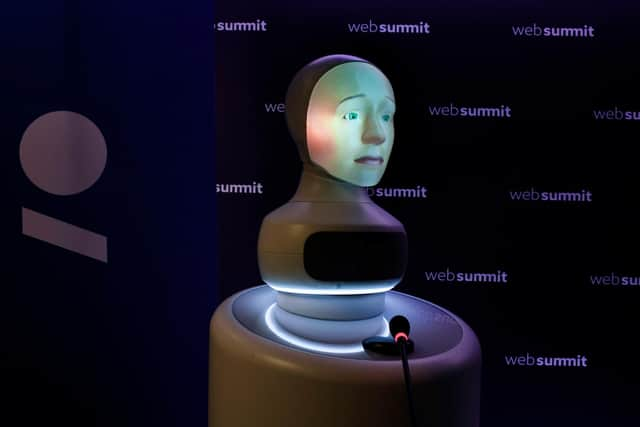Robot 'companion' may combat memory loss and depression in people with dementia
Powered by artificial intelligence (AI), the “desktop robot” called Furhat has human-like expressions and is able to speak.
The National Robotarium, hosted by Heriot-Watt and Edinburgh Universities, will examine whether the robot has a beneficial effect on people with dementia.
Advertisement
Hide AdAdvertisement
Hide AdThe same project, running over the next four years, will also trial on a larger scale the effect of a graphic character on a tablet, which will be easier and cheaper for people to access in the short term.


In both cases a “companion” powered by AI will prompt memories using pictures, video and sound, both from a person with dementia’s own life, and cultural events during their lifetime.
Professor Ruth Aylett of the National Robotarium, leading the research, said her team hoped to assess the effect of the desktop robot ahead of a time in the future when they become more easily and cheaply available.
There is evidence that a physical object can have a more powerful impact on people than a character on a screen, she said.
Prof Aylett stressed the robot would not be able to empathise with dementia patients, but the aim is for them to be “believable”.
She compared the concept to that of a cartoon character.
“People know they're not real, and they don't expect them to have the full capacity of humans either,” she said.
“But they are interesting to interact with and people quite enjoy them.
“They don't see them as being a person as such, but they're willing to suspend their disbelief to some extent and treat them a little bit as if they were real, even though they know they're not real.”
Advertisement
Hide AdAdvertisement
Hide AdAI technology has the potential to play a key role improving the lives of those with cognitive diseases, she said.
Prof Aylett added: “One of the most difficult aspects of living with dementia can be changes in behaviour caused by confusion or distress. We know that people can experience very different symptoms that require a range of support responses.
"Current intervention platforms used to aid memory recollection often take a one-size-fits-all approach that isn’t always suitable to an individual’s unique needs.”
The idea for the ground-breaking ‘Agent-based Memory Prosthesis to Encourage Reminiscing’ (AMPER) project came from Dr Mei Yii Lim, a co-investigator of the project and an experienced memory modelling researcher.
Dr Lim said: “AMPER will explore the potential for AI to help access an individual’s personal memories residing in the still viable regions of the brain by creating natural, relatable stories. These will be tailored to their unique life experiences, age, social context and changing needs to encourage reminiscing.”
The project is also supported by dementia experts at Strathclyde University.
Other partners include the charity Sporting Memories, which delivers reminiscence therapy to people with dementia through video footage in day care centre settings, NHS Scotland Neuroprogressive and Dementia Network, and the Latin American Network for Dementia Research.
A message from the Editor:
Thank you for reading this article. We're more reliant on your support than ever as the shift in consumer habits brought about by coronavirus impacts our advertisers.
If you haven't already, please consider supporting our trusted, fact-checked journalism by taking out a digital subscription.
Comments
Want to join the conversation? Please or to comment on this article.
